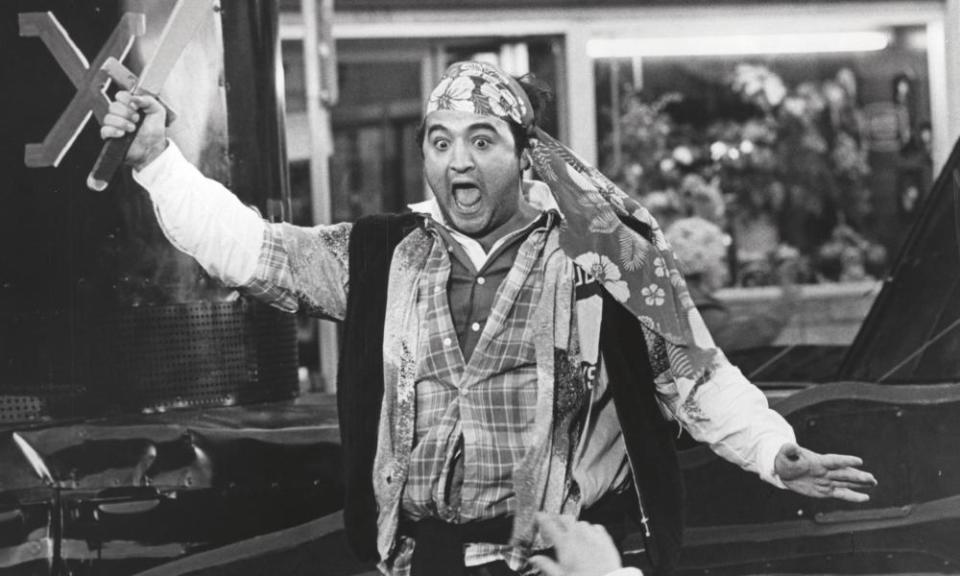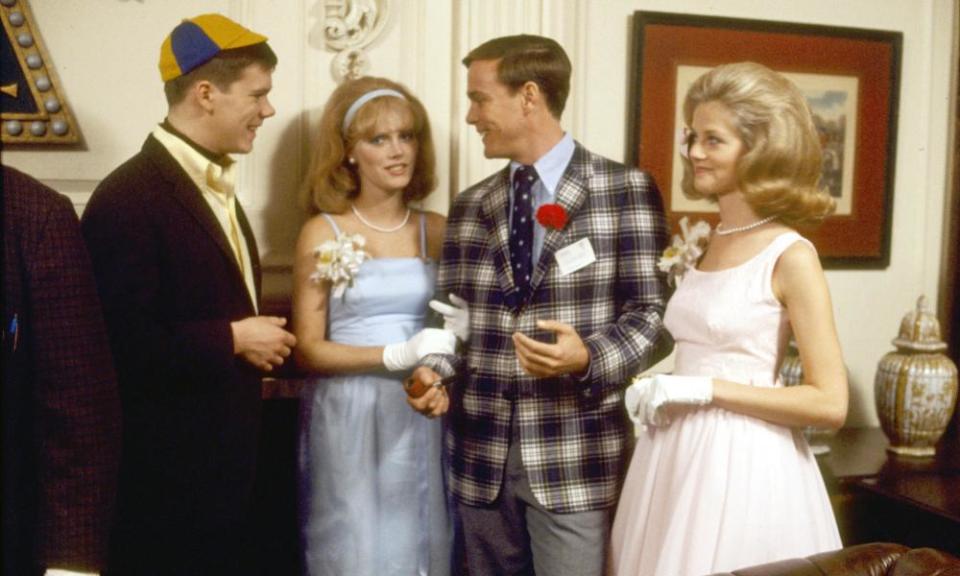Animal House at 40: why the slobs v snobs comedy remains essential
Since its release in 1978, John Landis’s raucous campus comedy might seem problematic with much of its humor but there are still valid lessons to be gained

At a time when cultural commentators intently comb through older works of fiction for offenses against modern mores of propriety, there’s no target fatter than Animal House.
The clear crowning achievement of the National Lampoon comedy madhouse, this slobs v snobs frat-off violated every available standard of decency in a boozy, anarchic stupor. Take your pick: the gay panic undertones roiling over at the spank-happy Omega house, the set piece in which the lovable louts of Delta house bring some ladies to an Otis Day show only to scamper away yelping that “the Negroes stole our dates”, John Belushi’s conspiratorial eyebrow waggle through the fourth wall as he peeps on a half-naked sorority girl. Not to mention one particularly queasy sequence in which meek Pinto (Thomas Hulce) debates with the angel and devil on his shoulders over whether he should rape a passed-out teenybopper. He ultimately decides against it, but it’s a pretty close call.
Forty years out from the initial release, it would seem that the chronicle of Faber College’s most hilariously chaotic year on the books just wasn’t made for these times, to crib a phrase. But there’s a lucid, fully-formed ideology behind all the liquor-soused antics, and it’s surprisingly well-suited to the bitter, fractious, jaded America of the present. Beneath every historical interlude of hedonism lies a foundation of nihilism, and the Deltas’ gleeful anti-everything ethic looks frightfully familiar in a modernity reaching a critical mass of disgusted cynicism. It’s easy to point at the film’s transgressions and conclude that Animal House has not “aged well,” but in the meanwhile, its attitude has curdled back into relevance. If anything hasn’t aged well, it’s morale in the United States.
Though the script skewers nostalgia by setting itself in the not-so-innocent yesteryear of 1962, in spirit, Faber College’s stately campus is situated squarely in the post-hippie, pre-Reagan moment. The National Lampoon rejected the failed peace-and-love utopia of the flower children, and blanched at the slick-haired sycophants that would go on to form the yuppie class during the 80s. (You can almost see the undergrads at the Omega house going on to slobber at the Armani-loafered feet of Wall Street’s Gordon Gekko.)

The Deltas extend equal contempt to the moral deformities in their rival frat and anyone cornball enough to believe in something. All it takes for a red-blooded young man to ingratiate himself with the coeds from Emily Dickinson College is claiming to be into folk music and “women’s lib”; Belushi smashing the Peter, Paul and Mary castoff’s guitar offers a bracing, cathartic symbol for the expulsion of the counterculture’s remaining vestiges.
Fully abandoning any formal credo leaves a person with the options to despair or embrace it, and the Deltas advance the latter choice to its sloppy logical conclusion. Fat, drunk and stupid may be no way to go through life, but it certainly takes the edge off. They rebel against a world they want nothing to do with through partying, insulating themselves from the mellow-harshing responsibilities of adult life by remaining in college indefinitely.
It’s a potent weltanschauung at a time marked by a disillusionment unseen in such severity since real life broke the rose-colored promise of the LSD droppers. The constant news ticker of atrocities running over the past couple of years has left many Americans withdrawn while far from apathetic. An exhaustion with the status quo split both major political parties into pieces, and gave way to candidates pushing further to the left and right than ever before. An unexpectedly expansive faction of voters moved away from the two-party system entirely, united in their inability to find any figure worth their support in the establishment. Anti-establishment-ism just so happens to be the one principle that Animal House dares to get behind. The Deltas are staunch in their opposition to every form the Man might take, from a humorless dean to the local authorities. It doesn’t take much of a stretch for a viewer in 2018 to find some satisfaction in a film that offers personal pleasure as the primary act of resistance against a world of assorted bullshit.
Bluto, Pinto, weaselly Otter, galumphing Flounder, all the half-wasted slackers that Animal House dared to put forth as heroes – their code of conduct belongs in a less mindful past, but their philosophy was ahead of its time. Pre-med or pre-law, it’s all the same thing to Otter, who’s divided life beyond Faber into polite society’s compromised professionals and the pure honesty of no longer giving a damn. If Animal House can make a viewer in the present pine for the good ol’ days, it’ll be for the time when it was a bit simpler and safer to stop caring. Once upon a time, the stakes were low enough that America’s youth could afford the luxury of blithe non-participation without fascism sneaking in behind them. Their rallying cry? “Toga! Toga! Toga!”

